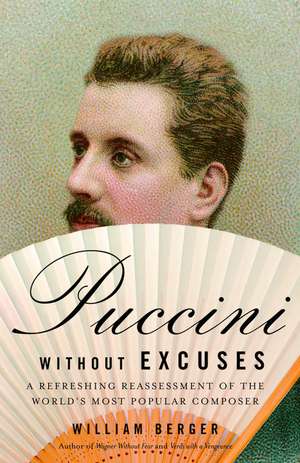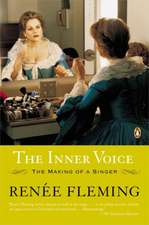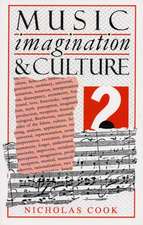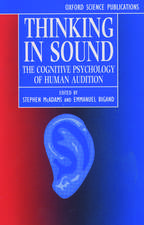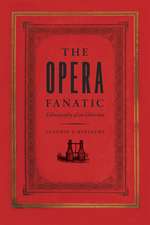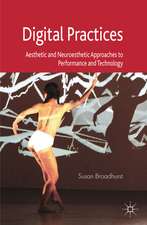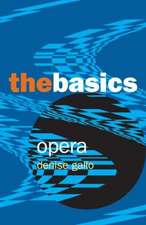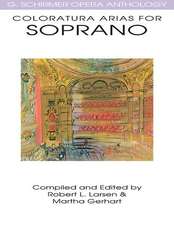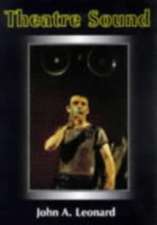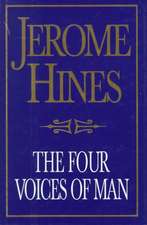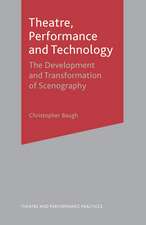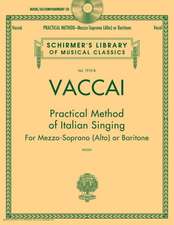Puccini Without Excuses: A Refreshing Reassessment of the World's Most Popular Composer
Autor William Bergeren Limba Engleză Paperback – 31 oct 2005
In this witty and informative guide for beginners and fans alike, William Berger sets the record straight, reclaiming Puccini as a serious artist. Combining his trademark irreverent humor with passionate enthusiasm, Berger strikes just the right balance of introductory information and thought-provoking analysis. He includes a biography, discussions of each opera, a glossary, fun facts and anecdotes, and above all keen insight into Puccini’s enduring power. For anyone who loves Puccini and for anyone who just wonders what all the fuss is about, Puccini Without Excuses is funny, challenging, and always a pleasure to read.
INCLUDES:
_ Why Puccini’s art and its message of hope is crucial to our world today
_ How Anglo audiences often miss the mythic significance of his operas
_ The use of his music as shorthand in films, from A Room with a View to Fatal Attraction
_ A scene-by scene analysis of each opera
_ A guide to the wealth of available recordings, books, and videos
Preț: 126.77 lei
Nou
Puncte Express: 190
Preț estimativ în valută:
24.26€ • 26.34$ • 20.38£
24.26€ • 26.34$ • 20.38£
Carte disponibilă
Livrare economică 01-15 aprilie
Preluare comenzi: 021 569.72.76
Specificații
ISBN-13: 9781400077786
ISBN-10: 1400077788
Pagini: 471
Ilustrații: MAPS & ILLUSTRATIONS
Dimensiuni: 135 x 202 x 27 mm
Greutate: 0.34 kg
Editura: Vintage Books USA
ISBN-10: 1400077788
Pagini: 471
Ilustrații: MAPS & ILLUSTRATIONS
Dimensiuni: 135 x 202 x 27 mm
Greutate: 0.34 kg
Editura: Vintage Books USA
Notă biografică
William Berger was born in California and studied Romance languages and music at the University of California at Santa Cruz. He worked for five years at the San Francisco Opera Company, where he acquired for the company’s recorded music collection. He is the author of Wagner Without Fear: Learning to Love–and Even Enjoy–Opera’s Most Demanding Genius and Verdi With a Vengeance: An Energetic Guide to the Life and Complete Works of the King of Opera. He is a frequent lecturer and radio commentator and has recently been a regular host for New York Public Radio’s Overnight Music. He has written libretti, performance pieces, and articles on a wide variety of topics including architecture, religion, and, of course, music. He is a music host for WNYC radio and lives in New York.
Extras
Part One
the case of puccini
Why Puccini? Why Now?
An Introduction
Without Puccini, there is no opera; without opera, the world is an even drearier place than the evening news would have us think. This book is aimed, firstly, at people who would have trouble agreeing with either part of that sentence.
To begin with, there is the issue of opera in general. I do not hold with those who believe that opera is a dying art form. The same things have been said about opera almost since its invention. Opera was said to be doomed when the castrati disappeared in the eighteenth century, when the Napoleonic Wars shut down the conservatories in the early nineteenth century, when tonality was redefined in the twentieth century, and so on. Movies, television, radio, and the Internet were each supposed to nail the coffin lid shut, and all of those media have become part of the opera story. If opera were mortal, it would have died by now.
Yet opera has been neatly contained in an obscure corner, thought to be only for, ahem, "certain" people, and this riles me. I believe opera is the most important art form. It is not the most important because, as is always said, it subsumes every other art form (which happens to be true), but because at its best it has the ability to probe deeper into the human experience than any other art form. There are never any easy answers in opera, and it promotes critical thinking. This is why fans are always said to be so passionate. While I can celebrate the high profile of opera in America today, I wish it were even higher-much higher.
There are, however, impediments to raising this profile. Opera will always be considered a foreign art form, and we see all our national neuroses about things foreign in our approach to opera. It will always be marginalized to some degree. Opera continues to attract the elitist label. That there are rich people who support and attend the opera is beyond question, but I must wonder why it is that opera remains the single great signifier of the effete elite. You have all seen the images on television: overdressed, ancient, white audiences wielding lorgnettes while overfed woman onstage hits earsplitting high note. It doesn't matter that this image has little basis in reality-it exists and is with us forever. Had there never been this "opera house of the imagination," it would have been necessary to invent it. And the image continues to keep opera, and all its considerable power, away from many, many people.
Conversely, the arts marketing people have been working overtime for a generation or so to combat this idea, and in doing so have perhaps overstepped their bounds. Opera is not elite, they have maintained. It's fun, and (worst of all), it's good for you, like cultural cod liver oil. This is America. We have to believe, or pretend, that something has an uplifting moral effect in order to support it (cf. baseball). I doubt that opera has ever made anyone a better person. I don't think baseball has either, but I love it all the same. Quality should be an end in itself. Furthermore, opera is elitist, but not in the way it is assumed by detractors to be. It is phenomenally expensive to produce and always has been, and therefore must be funded by someone (the king, corporate foundations, whomever). It is elitist in its performers: only about one in a million people (by one estimate) is born with the instrument necessary to make the sounds required, and only very few of them can follow through on their gift. And it is elitist in its requirements of its audience. We are expected to pay attention if we are to cull what can be culled from the experience. We seem to be able to assimilate these ideas in sports. We ought to be able to do something analogous for opera.
Leaving aside, for now, the issue of opera's continuing, illogical, and urgent validity in the world today, we must focus on Puccini within that world. On the one hand, a Puccini fan should have no cause for complaint. Puccini's works are in the repertory of every company, major and minor, and are hugely available on recordings and video. The numbers are unreliable, but I have read that one-fourth of all opera performances in the United States are of three of Puccini's most popular operas (La bohème, Tosca, and Madama Butterfly). The number seems plausible. Yet this alone can be a cause for complaint among fans. There is a tendency toward either fossilization of performance or hysterical attempts to "revitalize" these works, both of which have the effect of reducing their inherent vitality. In general, critics, performers, directors, and audiences have reached a stalemate on this man's art. People like Puccini, and many love him, but one gets the feeling that he is approached in this country as a sort of guilty pleasure, like dessert. I never understood this stance, and let me say right off that I am absolutely allergic to anything that reeks of the sentimental. So how could I stomach Puccini? I have always found a huge degree of insight in his works, and was shocked to discover that there were others who didn't.
A hundred years ago, there may have been something "old-fashioned" about Puccini. He relied heavily on melody, with which he was ostentatiously gifted, and much of the popularity of his operas was due to the "hit tunes," the big arias, in his work. The general movement of opera composers at the time was away from a reliance on the aria and toward an absolute horror of melody. This was a huge issue of debate at the time. It need be less so now. Audiences seem to comprehend that there are different styles of opera, and no one in their right mind posits one form only as the right way. Furthermore, Puccini's arias, magnificent though they may be, are not the whole of the story. There was recently an interesting movie called À ("Pi"). In it, a young mathematician is on the verge of discovering a sequence of numbers that forms the numerical identity of God. Naturally, everyone wants to wring the secret out of him, from Wall Street to religious factions. At one point, our hero is captured and tortured to reveal the equation. He attempts to explain to his captors, "It's not the numbers . . . they're just numbers! It's the spaces in between them and their relationship to each other-THAT'S where God is!" It occurred to me that this was the most elegant explanation of opera I had ever heard. The numbers-that is, the arias, or the hits, or the "big" moments-are not the point. Of course, as in À, they have to be the "right" numbers, but those are not the essence. The point is the work as a whole. Example: Musetta's famous waltz from Act II of La bohème. This, by any standards, is a hit. Snippets of it are heard everywhere. Fine. But later in the opera, Musetta's sometime lover Marcello will include phrases of the waltz while he is pondering how much he misses her. It is the same music, yet it is entirely different. And we in the audience can experience the relation of the two moments to each other, how there is always something a little painful in joyous moments because we will know they will pass, and something a little sweet in painful moments because they cause us to remember the times of fulfillment. This is how one can best appreciate Puccini's genius. There are lots of great waltzes in the world, but there is only one Bohème.
Another large problem with the perception of Puccini, I came to realize, is the issue of verismo. This is the name given to a genre of opera current around the turn of the last century. It is hard to define: in fact, I address the issue on nearly every page of this book and must warn you right off that I never come close to defining it. Suffice it to say for now that composers like Puccini were seeking a direct communication with their audiences, avoiding everything that looked like "artistry" or "technique." Of course, they used tons of artistry and technique in their works, but they still had the elusive ideal of verismo to guide them. In cinema, this trend became known as neoverismo in a slew of Italian masterpieces from the mid-twentieth century. (It is called "neo" verismo because the operatic and literary output in the genre fifty years previously was the original verismo.) Any film student can tell you that most of the films thus categorized are not "pure" in their usage of the techniques of the genre, which stress the "invisible hand of the creator." In Bicycle Thief, for example, there is a crowd scene during a sudden rainstorm. The intended effect is to show people caught, quite casually, in the rain. The few seconds of film took an entire day and a squadron of Rome's fire department to get the exact "impromptu" effect the director wanted. The same is true for our contemporary films of the "Dogma" school: only one or two films from Denmark truly qualify as "Dogma" films, but their effect on filmmaking in general is enormous. So while Puccini is not a "pure" verismo composer, we must consider the issues at stake in the genre in order to understand him. (These issues are explored throughout the book.)
The verismo school of opera is not particularly well understood today. Times change, and audiences and performers naturally respond to certain styles more easily than to others. Right now, baroque opera is very well represented in theaters. There are exciting, well-sung productions of long-neglected works by Handel and others given to enthusiastic audiences. No one in their right mind could have seen this coming forty years ago. Furthermore, I see more diverse audiences at those performances than I do at the standard repertory, all eating it up without the slightest bit of explanation necessary. Fifty years ago, it would have taken the average music fan a week of lectures just to be able to sit through such a "static" opera without pulling out his or her hair. Today's audiences take it all in stride.
Handel's operas are stylized in the extreme and conform to certain conventions that draw a neon light, so to speak, around the staginess of the work being given. This is the very opposite of verismo, which seeks to show life as it is among people as they are. All good and well, but how can we look for life as it is at the opera house, of all crazy places? Furthermore, it takes a certain kind of performance to make verismo come alive. The traditions of performing verismo are quite unacceptable in the world today-they seem like overacting, overscreeching, and so forth. It simply doesn't work. But what will work instead? Very, very few performers have found a formula. While Handel's operas can come to life with the talents and temperaments of today's performers, verismo eludes a great many of them. Go and see a master class given by a great retired diva-Renata Scotto's spring to mind immediately. You can see her working with the young artists, who are all very talented and who know the techniques of operatic singing quite well. But when there is a piece of Puccini to be sung and evaluated, watch her literally trying to pull something out from inside the young singers! Just hitting the notes will simply not do. You need to feel them, live them, BE them, and of course deliver them across the footlights. Verismo is often translated as "realism" but the word is closer to "truth" in Italian.
Truth-there's a big word, and a big part of the problem. One can find truth in opera as long as it is fake enough (stylized enough) to allow us to draw a frame around it. But the direct, in-your-face work of Puccini is strangely elusive for today's performers and audiences. Puccini is considered "easy" opera and the classic composer to use when introducing new audiences to the medium. I seriously doubt if that is true in quite the same way it was fifty years ago. There is something in the frank emotions and lack of intellectual pretense that makes Puccini remarkably difficult for a modern audience. Furthermore, there is a remarkable subtlety (yes, subtlety) in his works. Melodies are driven home when necessary, but many of his most excellent effects are achieved with a superb economy of expression-a few notes here and there. We are not equipped to listen as closely as people were a couple of generations ago, and we miss a lot. Puccini's operas are not short because they are trivial. They are short because he says what he needs to efficiently and quickly. In this way, Puccini has become more "difficult" to fathom, while, ironically, a composer such as Wagner has become much easier for modern audiences than he was a few decades ago. It's time for a new look at Puccini. All the traditional assumptions have changed.
Beyond provoking the groups of people outlined in the first paragraph of this chapter, the main thrust of this book is aimed at those who want to delve, or delve more deeply, into the art of Giacomo Puccini. A certain amount has already been written, from quite specific points of view. And everyone seems to have a point of view. The musicologists, after a century of benign neglect or outright hostility, have been forced by the paying public to admit that Puccini has some musical validity after all. Since all their contempt (much of which, I will repeat throughout this book, seems based on thinly veiled racism, or at least on cultural assumptions so insidious that they border on racism) did not consign Puccini to the dustbin of history, they have, for a few years now, been turning themselves around to analyze this music with the same tools they applied to much of the abstract and emotionally retarded music of the twentieth century and have managed to discover a vocabulary that allows them to enjoy it without feeling that they have compromised their values. To be sure, much of what has been written lately is fine and long overdue: it is my hope that the reader will be inspired to research such works for his or her own deeper understanding of the music. I am especially indebted, and will refer continually, to the great musicological efforts of Mosco Carner, William Ashbrook, Julian Budden, and, more recently, Michele Girardi, and the fine biographical work (which contains a good deal more musical insight than some of the musical commentaries out there) of Mary Jane Philips-Matz. I am also indebted to and inspired by the wonderful work of Susan Vandiver Nicassio, whose work opens up greater vistas by using Puccini as a departure point. But I intend to address the issue in a slightly different way: What is the art of Puccini about? Why does it continue to captivate people, either directly in the opera house or in the many other forms where it is experienced? Since opera is the total performing arts experience, what is the most total way to experience it?
the case of puccini
Why Puccini? Why Now?
An Introduction
Without Puccini, there is no opera; without opera, the world is an even drearier place than the evening news would have us think. This book is aimed, firstly, at people who would have trouble agreeing with either part of that sentence.
To begin with, there is the issue of opera in general. I do not hold with those who believe that opera is a dying art form. The same things have been said about opera almost since its invention. Opera was said to be doomed when the castrati disappeared in the eighteenth century, when the Napoleonic Wars shut down the conservatories in the early nineteenth century, when tonality was redefined in the twentieth century, and so on. Movies, television, radio, and the Internet were each supposed to nail the coffin lid shut, and all of those media have become part of the opera story. If opera were mortal, it would have died by now.
Yet opera has been neatly contained in an obscure corner, thought to be only for, ahem, "certain" people, and this riles me. I believe opera is the most important art form. It is not the most important because, as is always said, it subsumes every other art form (which happens to be true), but because at its best it has the ability to probe deeper into the human experience than any other art form. There are never any easy answers in opera, and it promotes critical thinking. This is why fans are always said to be so passionate. While I can celebrate the high profile of opera in America today, I wish it were even higher-much higher.
There are, however, impediments to raising this profile. Opera will always be considered a foreign art form, and we see all our national neuroses about things foreign in our approach to opera. It will always be marginalized to some degree. Opera continues to attract the elitist label. That there are rich people who support and attend the opera is beyond question, but I must wonder why it is that opera remains the single great signifier of the effete elite. You have all seen the images on television: overdressed, ancient, white audiences wielding lorgnettes while overfed woman onstage hits earsplitting high note. It doesn't matter that this image has little basis in reality-it exists and is with us forever. Had there never been this "opera house of the imagination," it would have been necessary to invent it. And the image continues to keep opera, and all its considerable power, away from many, many people.
Conversely, the arts marketing people have been working overtime for a generation or so to combat this idea, and in doing so have perhaps overstepped their bounds. Opera is not elite, they have maintained. It's fun, and (worst of all), it's good for you, like cultural cod liver oil. This is America. We have to believe, or pretend, that something has an uplifting moral effect in order to support it (cf. baseball). I doubt that opera has ever made anyone a better person. I don't think baseball has either, but I love it all the same. Quality should be an end in itself. Furthermore, opera is elitist, but not in the way it is assumed by detractors to be. It is phenomenally expensive to produce and always has been, and therefore must be funded by someone (the king, corporate foundations, whomever). It is elitist in its performers: only about one in a million people (by one estimate) is born with the instrument necessary to make the sounds required, and only very few of them can follow through on their gift. And it is elitist in its requirements of its audience. We are expected to pay attention if we are to cull what can be culled from the experience. We seem to be able to assimilate these ideas in sports. We ought to be able to do something analogous for opera.
Leaving aside, for now, the issue of opera's continuing, illogical, and urgent validity in the world today, we must focus on Puccini within that world. On the one hand, a Puccini fan should have no cause for complaint. Puccini's works are in the repertory of every company, major and minor, and are hugely available on recordings and video. The numbers are unreliable, but I have read that one-fourth of all opera performances in the United States are of three of Puccini's most popular operas (La bohème, Tosca, and Madama Butterfly). The number seems plausible. Yet this alone can be a cause for complaint among fans. There is a tendency toward either fossilization of performance or hysterical attempts to "revitalize" these works, both of which have the effect of reducing their inherent vitality. In general, critics, performers, directors, and audiences have reached a stalemate on this man's art. People like Puccini, and many love him, but one gets the feeling that he is approached in this country as a sort of guilty pleasure, like dessert. I never understood this stance, and let me say right off that I am absolutely allergic to anything that reeks of the sentimental. So how could I stomach Puccini? I have always found a huge degree of insight in his works, and was shocked to discover that there were others who didn't.
A hundred years ago, there may have been something "old-fashioned" about Puccini. He relied heavily on melody, with which he was ostentatiously gifted, and much of the popularity of his operas was due to the "hit tunes," the big arias, in his work. The general movement of opera composers at the time was away from a reliance on the aria and toward an absolute horror of melody. This was a huge issue of debate at the time. It need be less so now. Audiences seem to comprehend that there are different styles of opera, and no one in their right mind posits one form only as the right way. Furthermore, Puccini's arias, magnificent though they may be, are not the whole of the story. There was recently an interesting movie called À ("Pi"). In it, a young mathematician is on the verge of discovering a sequence of numbers that forms the numerical identity of God. Naturally, everyone wants to wring the secret out of him, from Wall Street to religious factions. At one point, our hero is captured and tortured to reveal the equation. He attempts to explain to his captors, "It's not the numbers . . . they're just numbers! It's the spaces in between them and their relationship to each other-THAT'S where God is!" It occurred to me that this was the most elegant explanation of opera I had ever heard. The numbers-that is, the arias, or the hits, or the "big" moments-are not the point. Of course, as in À, they have to be the "right" numbers, but those are not the essence. The point is the work as a whole. Example: Musetta's famous waltz from Act II of La bohème. This, by any standards, is a hit. Snippets of it are heard everywhere. Fine. But later in the opera, Musetta's sometime lover Marcello will include phrases of the waltz while he is pondering how much he misses her. It is the same music, yet it is entirely different. And we in the audience can experience the relation of the two moments to each other, how there is always something a little painful in joyous moments because we will know they will pass, and something a little sweet in painful moments because they cause us to remember the times of fulfillment. This is how one can best appreciate Puccini's genius. There are lots of great waltzes in the world, but there is only one Bohème.
Another large problem with the perception of Puccini, I came to realize, is the issue of verismo. This is the name given to a genre of opera current around the turn of the last century. It is hard to define: in fact, I address the issue on nearly every page of this book and must warn you right off that I never come close to defining it. Suffice it to say for now that composers like Puccini were seeking a direct communication with their audiences, avoiding everything that looked like "artistry" or "technique." Of course, they used tons of artistry and technique in their works, but they still had the elusive ideal of verismo to guide them. In cinema, this trend became known as neoverismo in a slew of Italian masterpieces from the mid-twentieth century. (It is called "neo" verismo because the operatic and literary output in the genre fifty years previously was the original verismo.) Any film student can tell you that most of the films thus categorized are not "pure" in their usage of the techniques of the genre, which stress the "invisible hand of the creator." In Bicycle Thief, for example, there is a crowd scene during a sudden rainstorm. The intended effect is to show people caught, quite casually, in the rain. The few seconds of film took an entire day and a squadron of Rome's fire department to get the exact "impromptu" effect the director wanted. The same is true for our contemporary films of the "Dogma" school: only one or two films from Denmark truly qualify as "Dogma" films, but their effect on filmmaking in general is enormous. So while Puccini is not a "pure" verismo composer, we must consider the issues at stake in the genre in order to understand him. (These issues are explored throughout the book.)
The verismo school of opera is not particularly well understood today. Times change, and audiences and performers naturally respond to certain styles more easily than to others. Right now, baroque opera is very well represented in theaters. There are exciting, well-sung productions of long-neglected works by Handel and others given to enthusiastic audiences. No one in their right mind could have seen this coming forty years ago. Furthermore, I see more diverse audiences at those performances than I do at the standard repertory, all eating it up without the slightest bit of explanation necessary. Fifty years ago, it would have taken the average music fan a week of lectures just to be able to sit through such a "static" opera without pulling out his or her hair. Today's audiences take it all in stride.
Handel's operas are stylized in the extreme and conform to certain conventions that draw a neon light, so to speak, around the staginess of the work being given. This is the very opposite of verismo, which seeks to show life as it is among people as they are. All good and well, but how can we look for life as it is at the opera house, of all crazy places? Furthermore, it takes a certain kind of performance to make verismo come alive. The traditions of performing verismo are quite unacceptable in the world today-they seem like overacting, overscreeching, and so forth. It simply doesn't work. But what will work instead? Very, very few performers have found a formula. While Handel's operas can come to life with the talents and temperaments of today's performers, verismo eludes a great many of them. Go and see a master class given by a great retired diva-Renata Scotto's spring to mind immediately. You can see her working with the young artists, who are all very talented and who know the techniques of operatic singing quite well. But when there is a piece of Puccini to be sung and evaluated, watch her literally trying to pull something out from inside the young singers! Just hitting the notes will simply not do. You need to feel them, live them, BE them, and of course deliver them across the footlights. Verismo is often translated as "realism" but the word is closer to "truth" in Italian.
Truth-there's a big word, and a big part of the problem. One can find truth in opera as long as it is fake enough (stylized enough) to allow us to draw a frame around it. But the direct, in-your-face work of Puccini is strangely elusive for today's performers and audiences. Puccini is considered "easy" opera and the classic composer to use when introducing new audiences to the medium. I seriously doubt if that is true in quite the same way it was fifty years ago. There is something in the frank emotions and lack of intellectual pretense that makes Puccini remarkably difficult for a modern audience. Furthermore, there is a remarkable subtlety (yes, subtlety) in his works. Melodies are driven home when necessary, but many of his most excellent effects are achieved with a superb economy of expression-a few notes here and there. We are not equipped to listen as closely as people were a couple of generations ago, and we miss a lot. Puccini's operas are not short because they are trivial. They are short because he says what he needs to efficiently and quickly. In this way, Puccini has become more "difficult" to fathom, while, ironically, a composer such as Wagner has become much easier for modern audiences than he was a few decades ago. It's time for a new look at Puccini. All the traditional assumptions have changed.
Beyond provoking the groups of people outlined in the first paragraph of this chapter, the main thrust of this book is aimed at those who want to delve, or delve more deeply, into the art of Giacomo Puccini. A certain amount has already been written, from quite specific points of view. And everyone seems to have a point of view. The musicologists, after a century of benign neglect or outright hostility, have been forced by the paying public to admit that Puccini has some musical validity after all. Since all their contempt (much of which, I will repeat throughout this book, seems based on thinly veiled racism, or at least on cultural assumptions so insidious that they border on racism) did not consign Puccini to the dustbin of history, they have, for a few years now, been turning themselves around to analyze this music with the same tools they applied to much of the abstract and emotionally retarded music of the twentieth century and have managed to discover a vocabulary that allows them to enjoy it without feeling that they have compromised their values. To be sure, much of what has been written lately is fine and long overdue: it is my hope that the reader will be inspired to research such works for his or her own deeper understanding of the music. I am especially indebted, and will refer continually, to the great musicological efforts of Mosco Carner, William Ashbrook, Julian Budden, and, more recently, Michele Girardi, and the fine biographical work (which contains a good deal more musical insight than some of the musical commentaries out there) of Mary Jane Philips-Matz. I am also indebted to and inspired by the wonderful work of Susan Vandiver Nicassio, whose work opens up greater vistas by using Puccini as a departure point. But I intend to address the issue in a slightly different way: What is the art of Puccini about? Why does it continue to captivate people, either directly in the opera house or in the many other forms where it is experienced? Since opera is the total performing arts experience, what is the most total way to experience it?
